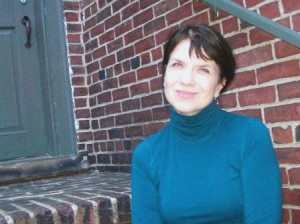
Lee Upton
Within the rollicking pages of her next book, Swallowing the Sea: On Writing & Ambition, Boredom, Purity & Secrecy, Lee Upton asserts that “writing is a spectacular form of gambling.” If that’s the case, Lafayette’s writer-in-residence and professor of English has hit the jackpot many times, her highly acclaimed prose and poetry the bright, jangly coins of a super-heated imagination.
A powerhouse in the publishing world and recipient of the prestigious Pushcart Prize for poetry and other awards, Upton is the author of five books of poetry, four books of literary criticism, one novella, and one co-authored book for children. Her work has appeared in The Best American Poetry, numerous other anthologies, and magazines such as The Atlantic, The New Republic, American Poetry Review, and Harvard Review. Swallowing the Sea can be classified as creative nonfiction and is forthcoming in 2012.
Prolific, yes, but Upton is the first to admit that writing is hard. You have to trust your instincts, hone your skills, and honor the force within. Having a good teacher helps, too.
Upton got her start at Michigan State University, where she paid her way through school working as a freelance reporter for a newspaper and other assorted jobs, including washing dishes and waiting tables. Her first poem was published in MSU’s student-run literary magazine, The Red Cedar Review. She found it gratifying, but the act of writing is what’s important, she says, then and now.
From there, Upton received an M.F.A. at the University of Massachusetts, Amherst in 1981 and then taught for a year in Japan and the Philippines through the University of Maryland’s program on military bases.
She published her first book of poetry, The Invention of Kindness, in 1984, before earning a Ph.D. in English literature from State University of New York at Binghamton.
A professor at Lafayette for at least 20 years, Upton is as enthusiastic about teaching as she is about building a poem, braiding the threads of a short story, or brandishing literary criticism.
“I’m very moved by the passion students have for writing,” she says. “There’s an intense energy and a willingness to experiment.”
Upton doesn’t take a one-size-fits-all approach to teaching the craft. Rather, she assesses each student’s work and then makes recommendations of writers they should read for inspiration. It’s about respecting voice and talent with an eye on isolating technique.
“When students hand in work I look for what’s not there,” she says, and like a personal trainer she designs exercises to strengthen a scene or bolster the use of metaphors to help students assemble a repertoire of tools to create memorable experiences on the page.
Upton likens writing poetry to “taking a vertical dive” and “slipping the bonds of normal sense,” and her outpouring of verse represents a descent of consciousness and a distillation of thought where anything can happen and usually does.
In her novella, The Flying Island, Upton’s mystical prose is weighted by desire and loss and the heartbreaking resolution of a character’s past. It is a study for any young writer on how to spin a perfect tale employing atmospheric scenes, interesting characters, and a plot that moves faster than the swirling currents of the island’s mist-filled home.
Although her first love is poetry (the most concentrated form of style, according to F. Scott Fitzgerald), she refuses to commit to one genre, enjoying the challenges and joys of each form. “My goal is to do something that hasn’t been done with the language before,” she says.
To that end, she’s had some help. Art professors Ed Kerns, Jim Toia, and Curlee Holton have all collaborated with her on projects outside the traditional bounds of literature. For Kerns, Eugene H. Clapp II ’36 Professor of Art, Upton wrote prose directly on his paintings. She is now writing about Toia’s work with sea creatures. For Holton, Roth Professor of Art and director of Lafayette’s Experimental Printmaking Institute, Upton wrote essays to accompany an exhibition and has collaborated on two artist books.
As for advice to fledgling writers, Upton says “take sips” from the creative wells of many other writers across genres and centuries.
“Each writer is a kind of gift to other writers,” she says. “Read their work and exhume their techniques. And keep on drinking.”

1 Comment
Comments are closed.